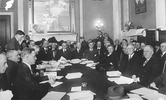The Saturday Evening Post decided to grace the cover of its Easter issue, with Easter being April 16 that year, with a Leyendecker portrait of a woman looking at her Easter bonnet.
Country Gentleman, however, went with a different theme.

Some in Washington, D. C. took time to play polo on this day.
Horses were much in evidence on that Holy Saturday in Washington, D. C., as a Junior Horse Show was also held.
The White House received visitors.
Which included a party of Camp Fire Girls.
Not everyone was taking the day off, however.
Today In Wyoming's History: April 15: 1922 1922 Wyoming Democratic Senator John Kendrick introduced a resolution to investigate oil sales at Teapot Dome, Wyoming (the Naval Petroleum Oil Reserve).
As the U.S. Senate's history site notes:
April 15, 1922

On April 15, 1922, Wyoming Democratic senator John Kendrick introduced a resolution that set in motion one of the most significant investigations in Senate history. On the previous day, the Wall Street Journal had reported an unprecedented secret arrangement in which the secretary of the Interior, without competitive bidding, had leased the U.S. naval petroleum reserve at Wyoming's Teapot Dome to a private oil company. Wisconsin Republican senator Robert La Follette arranged for the Senate Committee on Public Lands to investigate the matter. His suspicions deepened after someone ransacked his quarters in the Senate Office Building.
Expecting this to be a tedious and probably futile inquiry, the committee's Republican leadership allowed the panel's most junior minority member, Montana Democrat Thomas Walsh, to chair the panel. Preeminent among the many difficult questions facing him was, "How did Interior Secretary Albert Fall get so rich so quickly?"
Eventually, the investigation uncovered Secretary Fall's shady dealings, and Senator Walsh became a national hero. Fall would end up as the first former cabinet officer to go to prison. This and a subsequent Senate inquiry triggered several court cases testing the extent of the Senate's investigative powers. One of those cases resulted in the landmark 1927 Supreme Court decision McGrain v. Daugherty that, for the first time, explicitly established Congress's right to compel witnesses to testify before its committees.
Not unexpectedly, the Teapot Dome story, which was just breaking, and had been broken in the East the day prior, was big news in Wyoming.










No comments:
Post a Comment